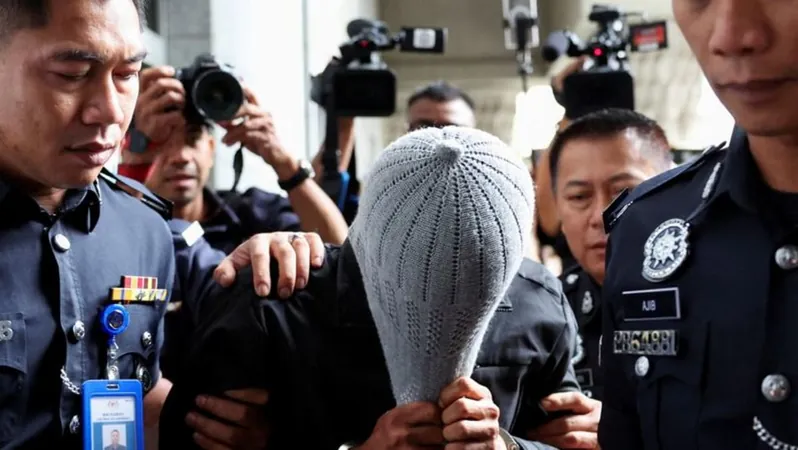
Uncovering a Disturbing Secret: How GISB Holdings Evaded Scrutiny Amidst Child Abuse Allegations in Malaysia
2024-10-03
KUALA LUMPUR: The shocking revelations surrounding the Malaysian conglomerate GISB Holdings (GISBH) are sending ripples of outrage across the nation.
Just three weeks ago, police raids in Selangor and Negeri Sembilan led to the rescue of 402 children believed to have been subjected to horrific abuses, including being groomed to engage in sexual abuse by their caretakers.
Following these harrowing discoveries, police froze 206 accounts linked to GISBH, amounting to over RM1.35 million (approximately US$31,979). In addition, various assets, such as luxury cars and watches, were seized, raising serious questions regarding the organization's financial operations.
Under increasing scrutiny, Selangor authorities declared GISBH to be an organization promoting deviant theological practices,
following similar action taken by Perlis the previous month. Senior executives of the group, including CEO Nasiruddin Mohd Ali, have been arrested, alongside a caretaker sentenced to ten years in prison for the abuse of boys under his care.
Despite this increasing crackdown, many are questioning the inadequacy and delayed response of authorities to the alleged malpractices of GISB. The Sultan of Selangor openly criticized the lackadaisical approach towards monitoring charity homes linked to the organization, suggesting that its sprawling network had been allowed to flourish unchecked for too long.
Experts believe fear of potentially sparking religious backlash has hindered investigations into GISB's activities. The conglomerate is believed to have ties with Al-Arqam, a sect banned for diverging from mainstream Islamic teachings in 1994, yet it harnessed a façade of legitimacy as a successful Muslim enterprise to elude oversight.
Growing Calls for Accountability
The civil group G25 voiced frustration at the slow progress, noting that investigations with JAKIM, the Malaysian Islamic Development Department, had been ongoing since 2019. They reiterated their shock that no decisive action against GISB had been taken despite authorities being aware of the situation for years.
The police chief, Razarudin Husain, defended law enforcement's actions, stating that a meticulous collection of intelligence was necessary before intervening. However, many experts contend that children's safety should have taken precedence and that immediate action should have been initiated once suspicions arose.
To date, authorities have rescued a total of 592 children and detained 359 GISB associates as part of their expanding investigation. Yet, despite the recent surge in actions, experts criticize the slow and ineffective responses leading up to this awful reality, where victims had to endure suffering for years.
From Perceived Threat to Beneficial Enterprise
The origins of GISB reveal a complex history intertwined with political concerns. Founded in 2010 as an offshoot of the Al-Arqam group, GISB flourished economically due to the #BuyMuslimFirst (BMF) campaign. Critics now contend that this campaign overshadowed scrutiny over their operations, allowing them to grow while avoiding regulatory oversight.
Financial assessments indicate that GISB possesses an estimated RM325 million in global assets, operating across 20 countries, with a revenue of RM187 million—figures that suggest their influence could deter serious investigations.
Even more troubling is the revelation that senior members had interactions with high-profile government officials, including Prime Minister Anwar Ibrahim. This relationship raises further doubts about the effectiveness of religious authorities in monitoring such organizations.
Public Outcry and Whistleblower Pressure
The emergence of online whistleblower networks has intensified this public outrage. Platforms such as the Pusat Kajian Ajaran Sesat have shone a spotlight on GISB's dubious practices, urging immediate action and accountability from the authorities.
In a bid to push for accountability, individuals like Dr. Asri, an Islamic scholar, had previously highlighted concerns but found their warnings dismissed by authorities. The police finally acted after extensive pressure mounted from concerned citizens and online communities.
Moving forward, experts call for stringent monitoring of GISB's extensive business operations to ensure compliance with legal standards and protect vulnerable individuals from exploitation. The need for a royal commission investigating these matters is now a pressing demand from civil society as trust in protective systems wanes.
The horrific abuses at GISB remind us of the urgent need for vigilance, accountability, and proactive measures to protect children and vulnerable communities in Malaysia. The question remains: will the authorities take decisive action to prevent such tragedies from recurring? The answer is yet uncertain, but many watch closely, demanding justice for the uncounted victims.


 Brasil (PT)
Brasil (PT)
 Canada (EN)
Canada (EN)
 Chile (ES)
Chile (ES)
 España (ES)
España (ES)
 France (FR)
France (FR)
 Hong Kong (EN)
Hong Kong (EN)
 Italia (IT)
Italia (IT)
 日本 (JA)
日本 (JA)
 Magyarország (HU)
Magyarország (HU)
 Norge (NO)
Norge (NO)
 Polska (PL)
Polska (PL)
 Schweiz (DE)
Schweiz (DE)
 Singapore (EN)
Singapore (EN)
 Sverige (SV)
Sverige (SV)
 Suomi (FI)
Suomi (FI)
 Türkiye (TR)
Türkiye (TR)